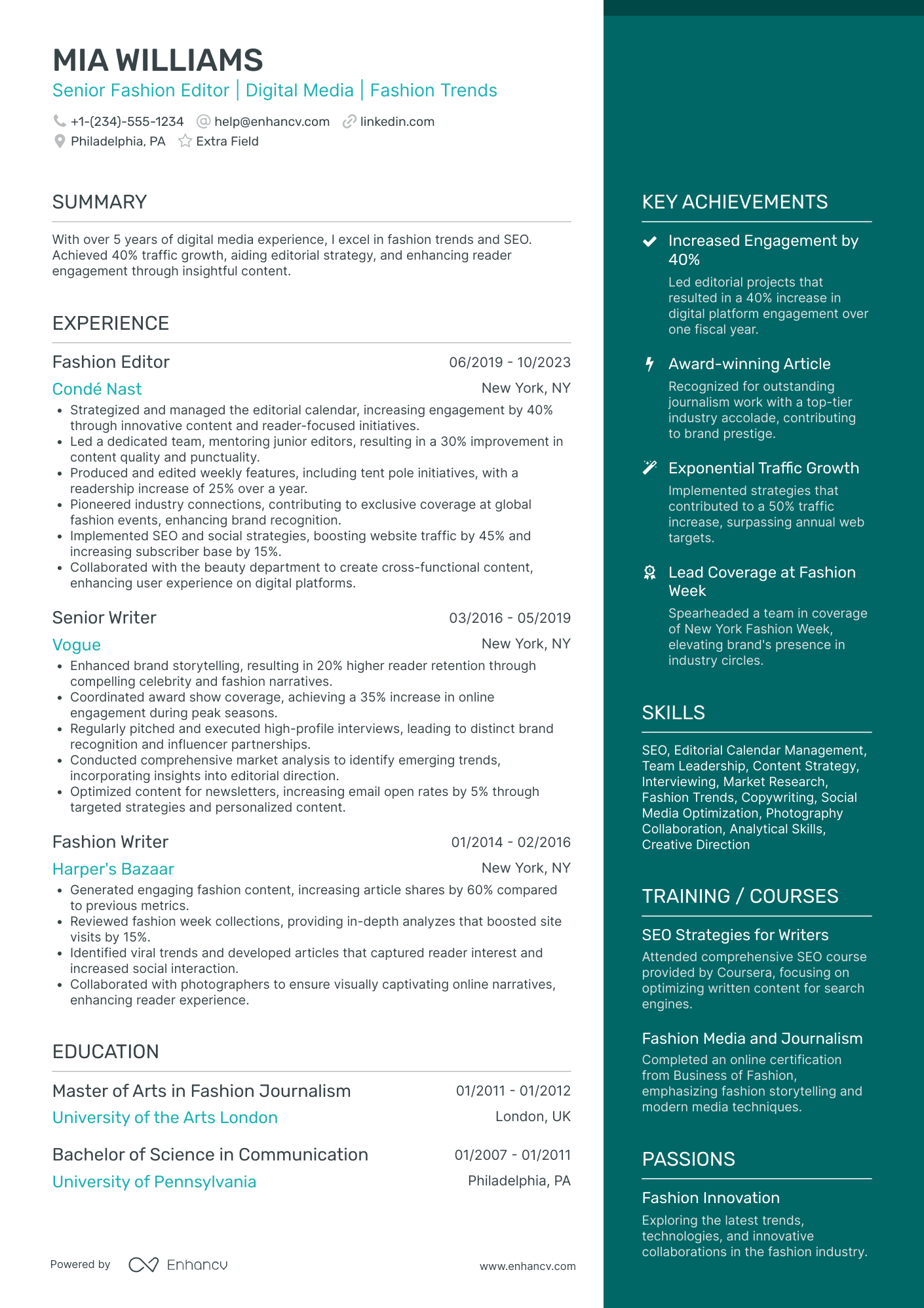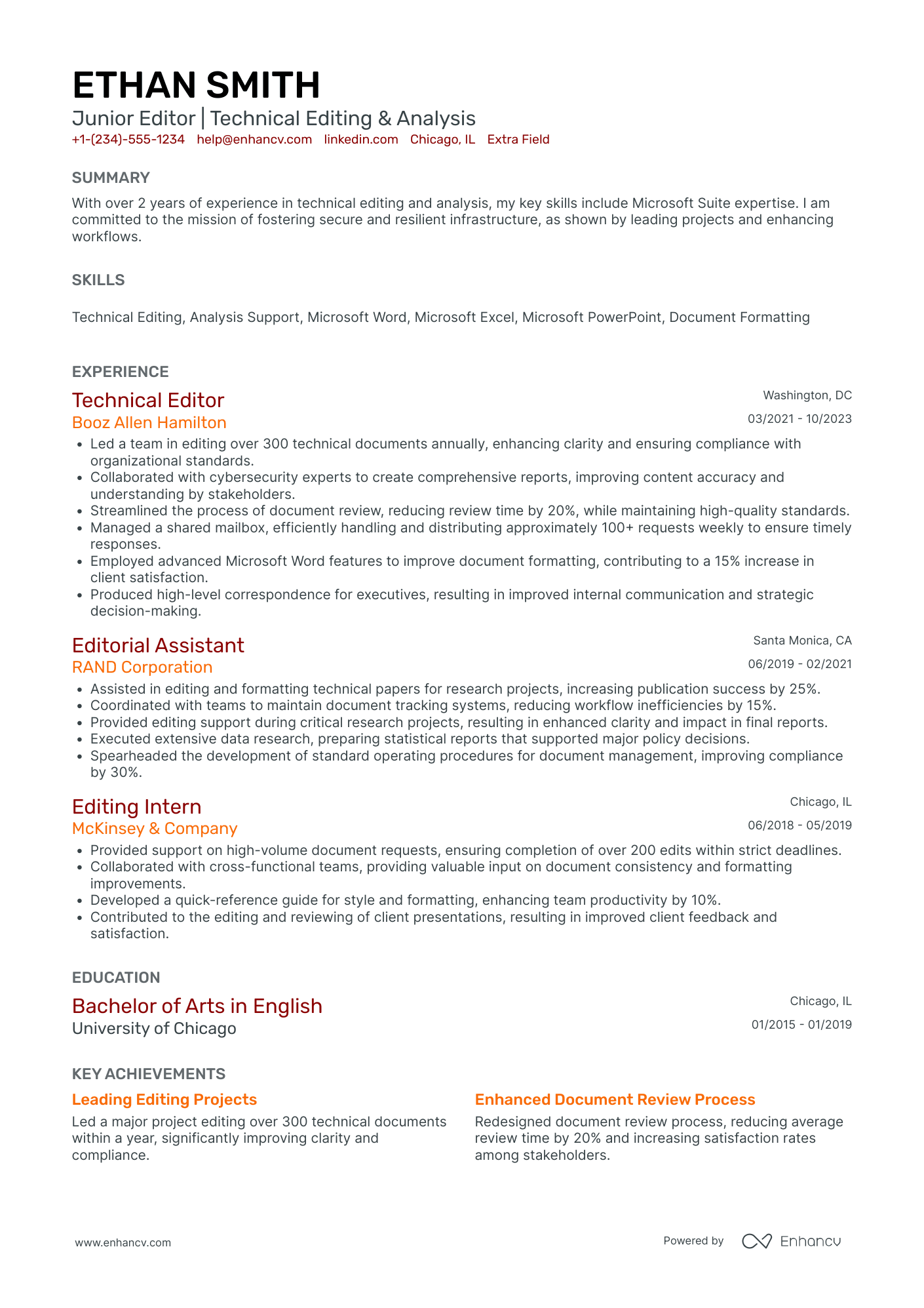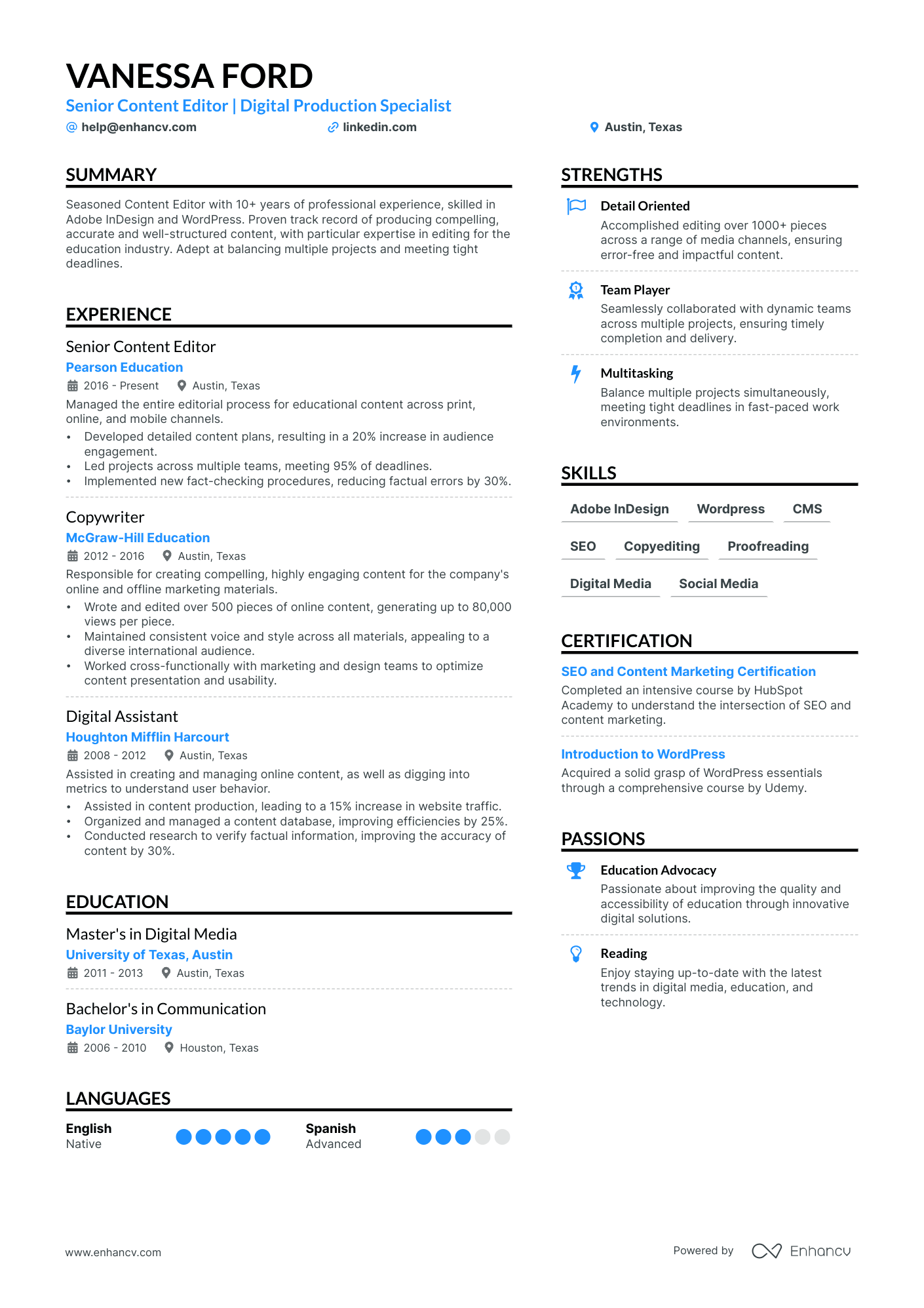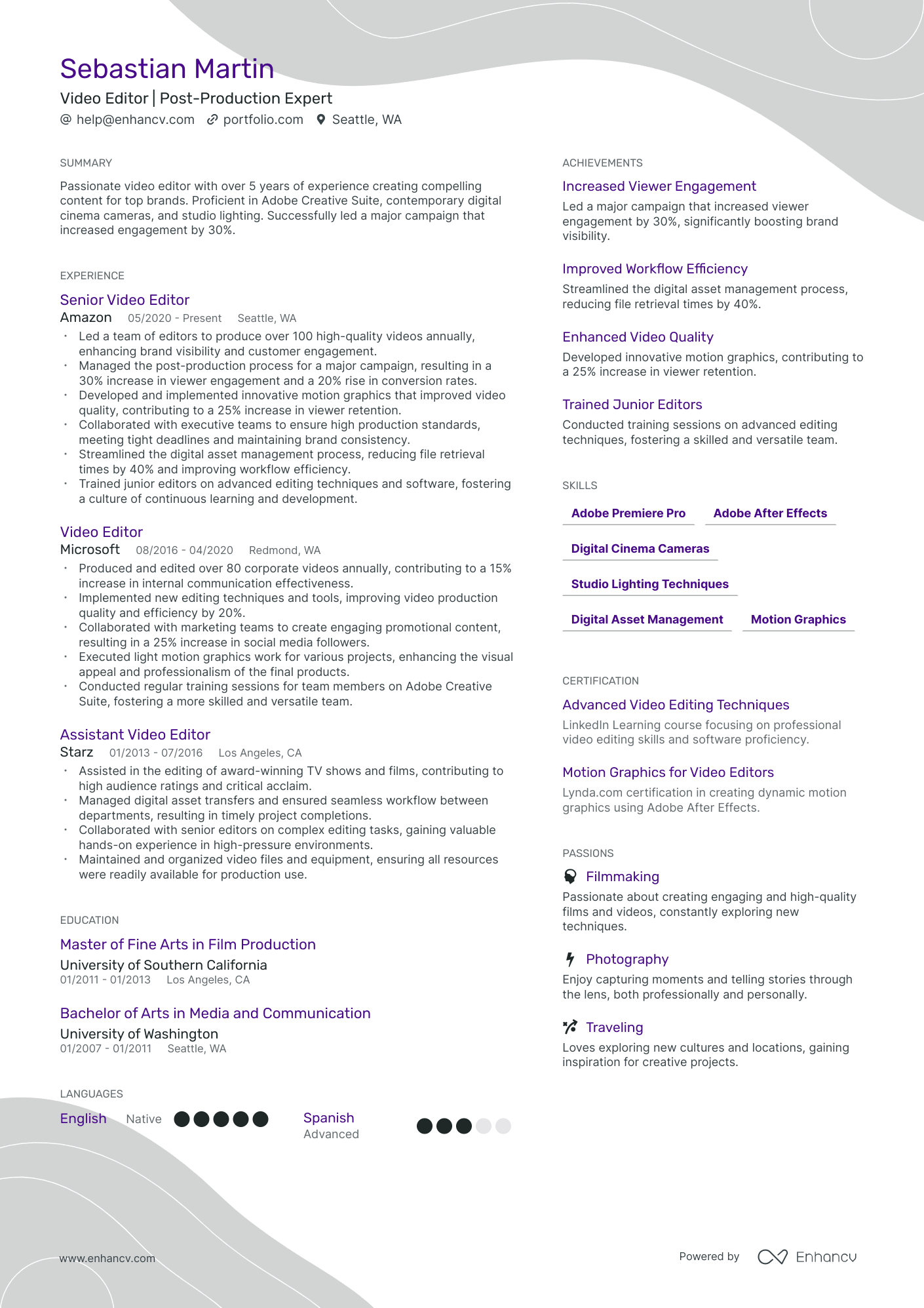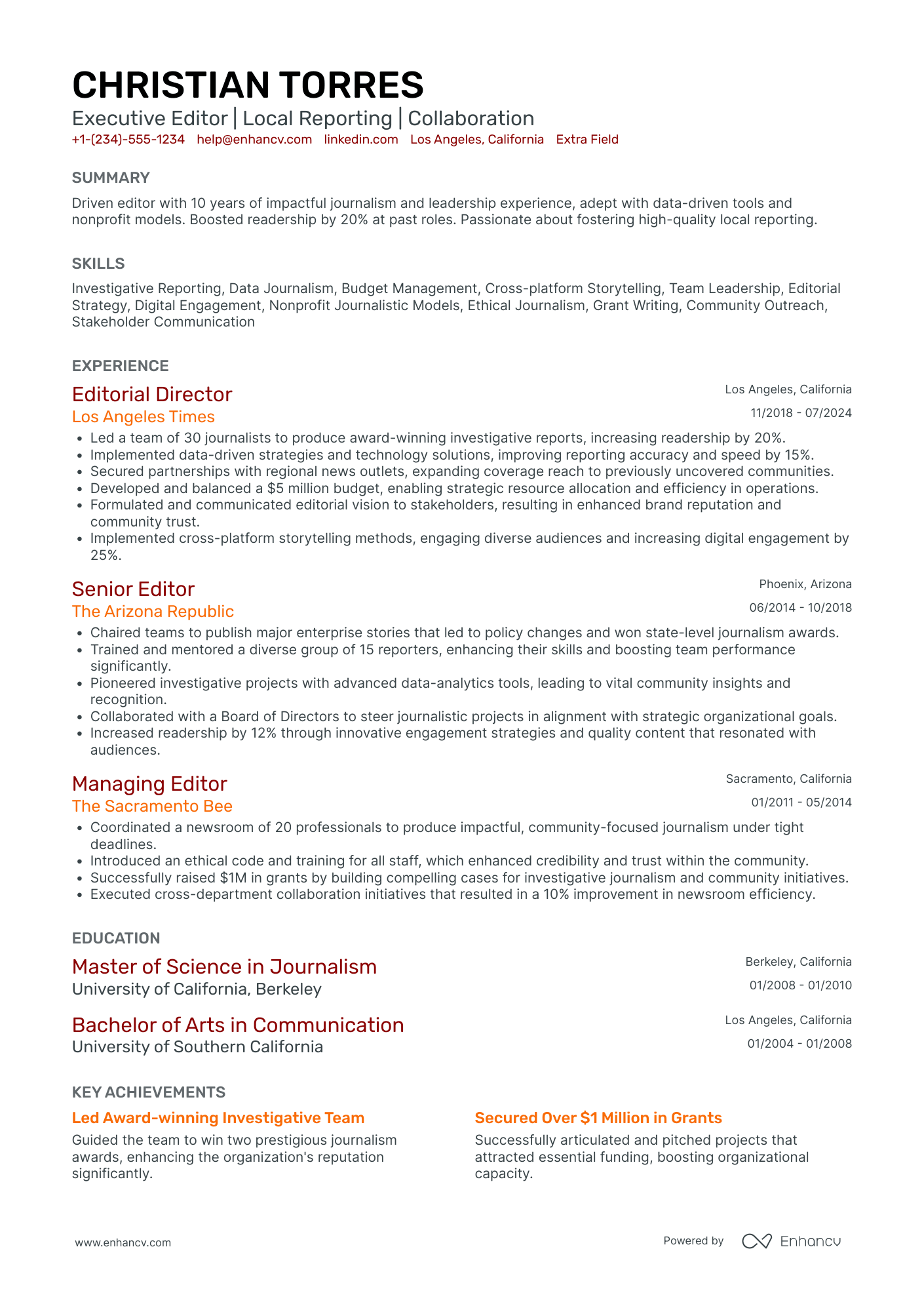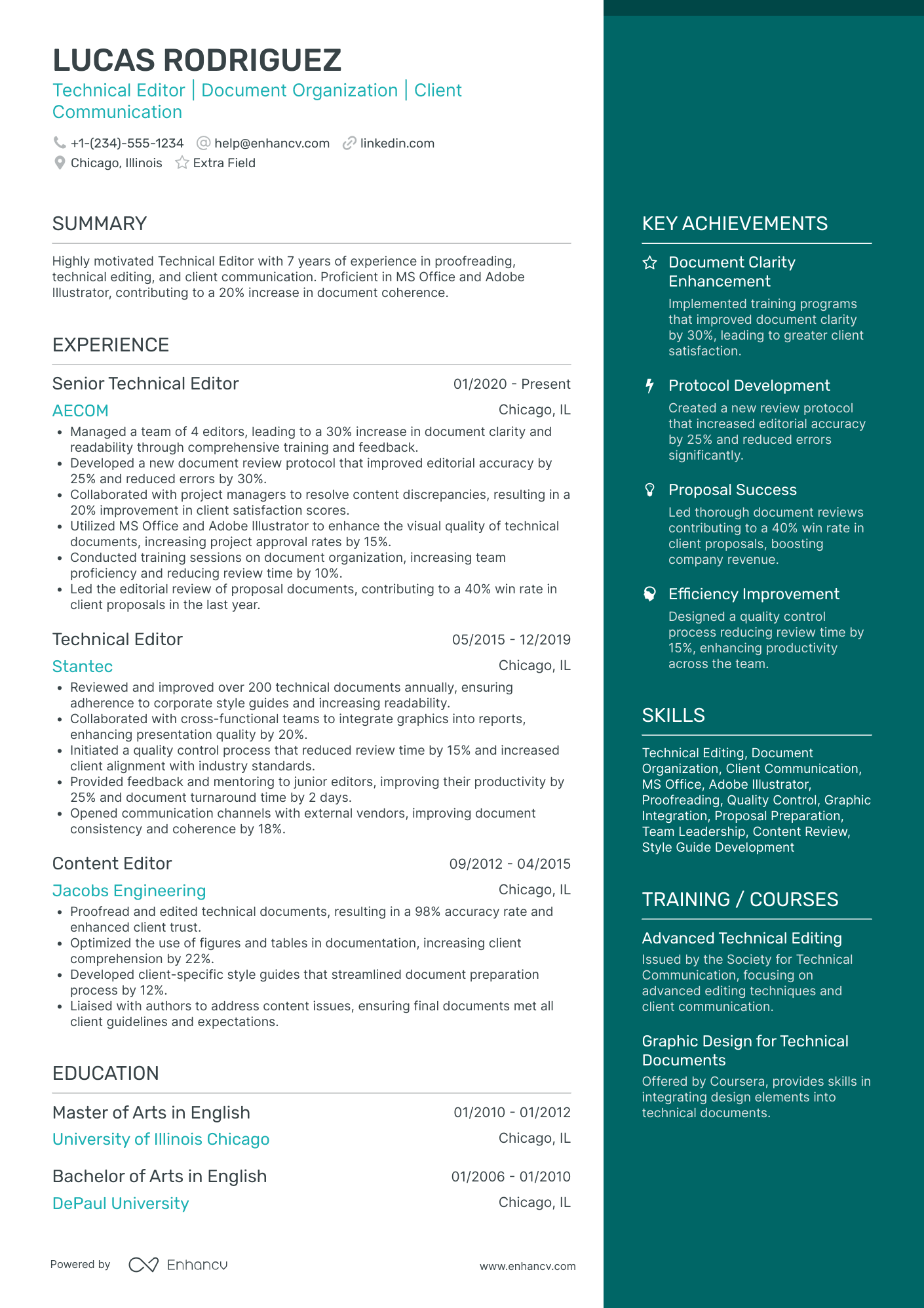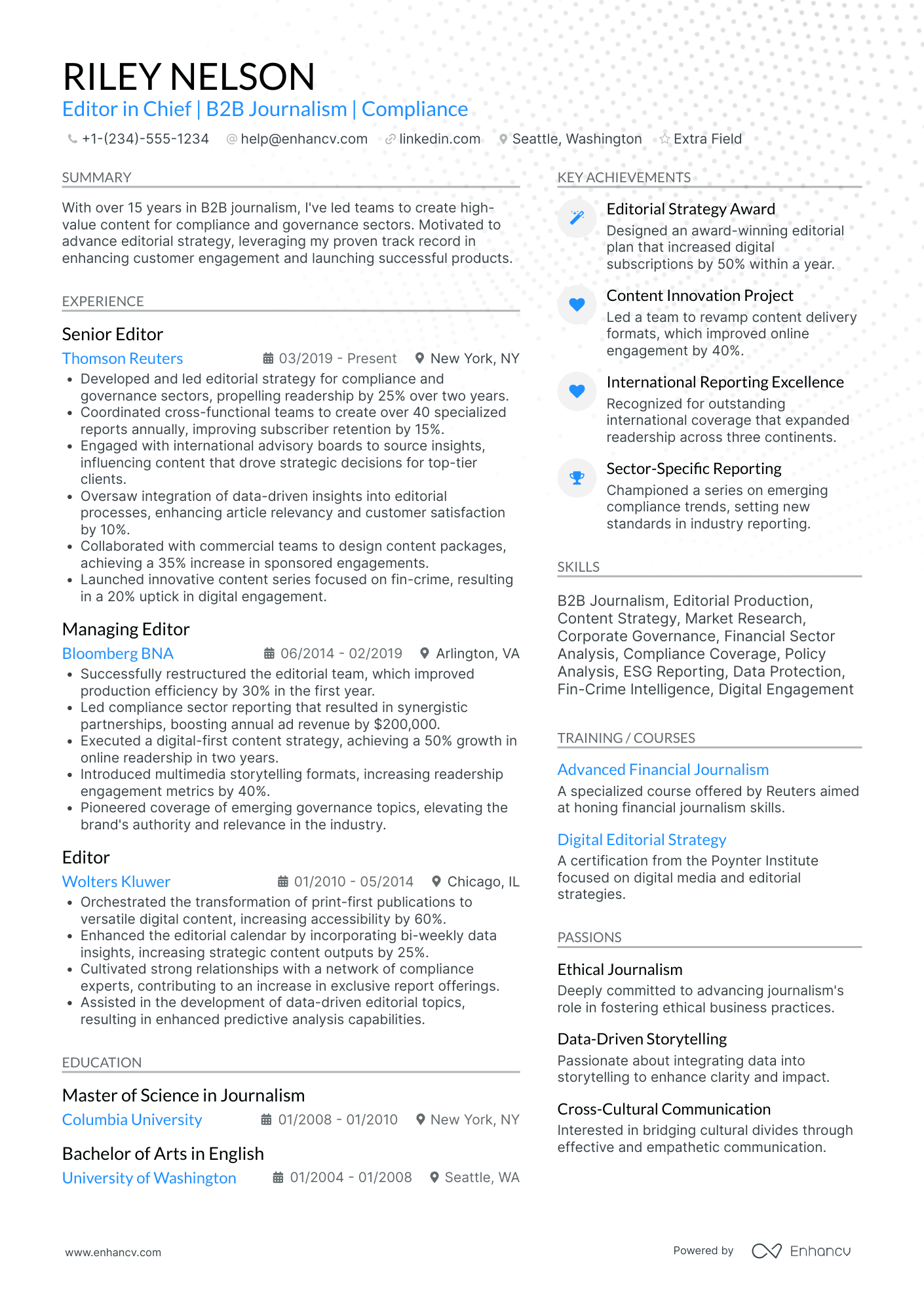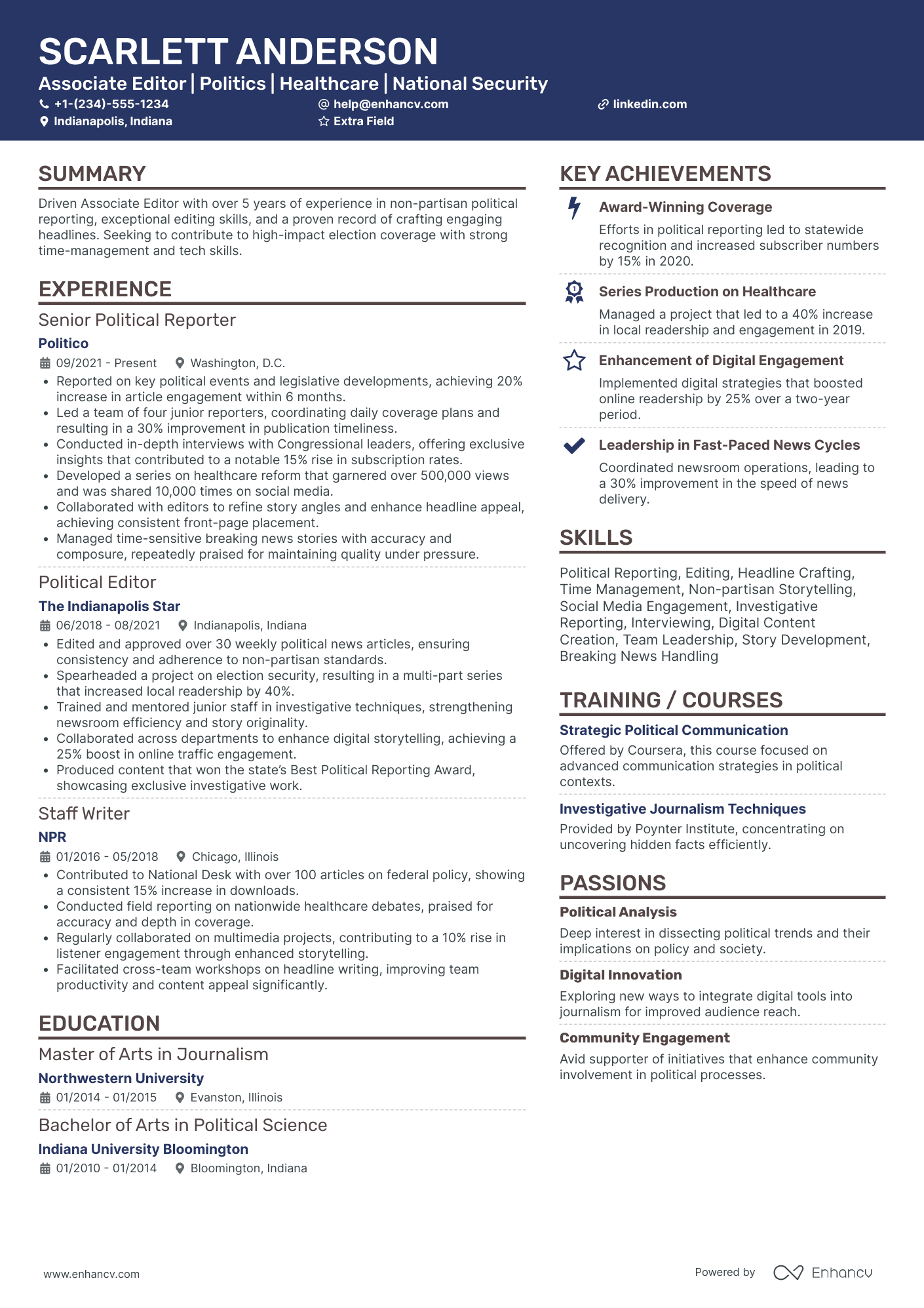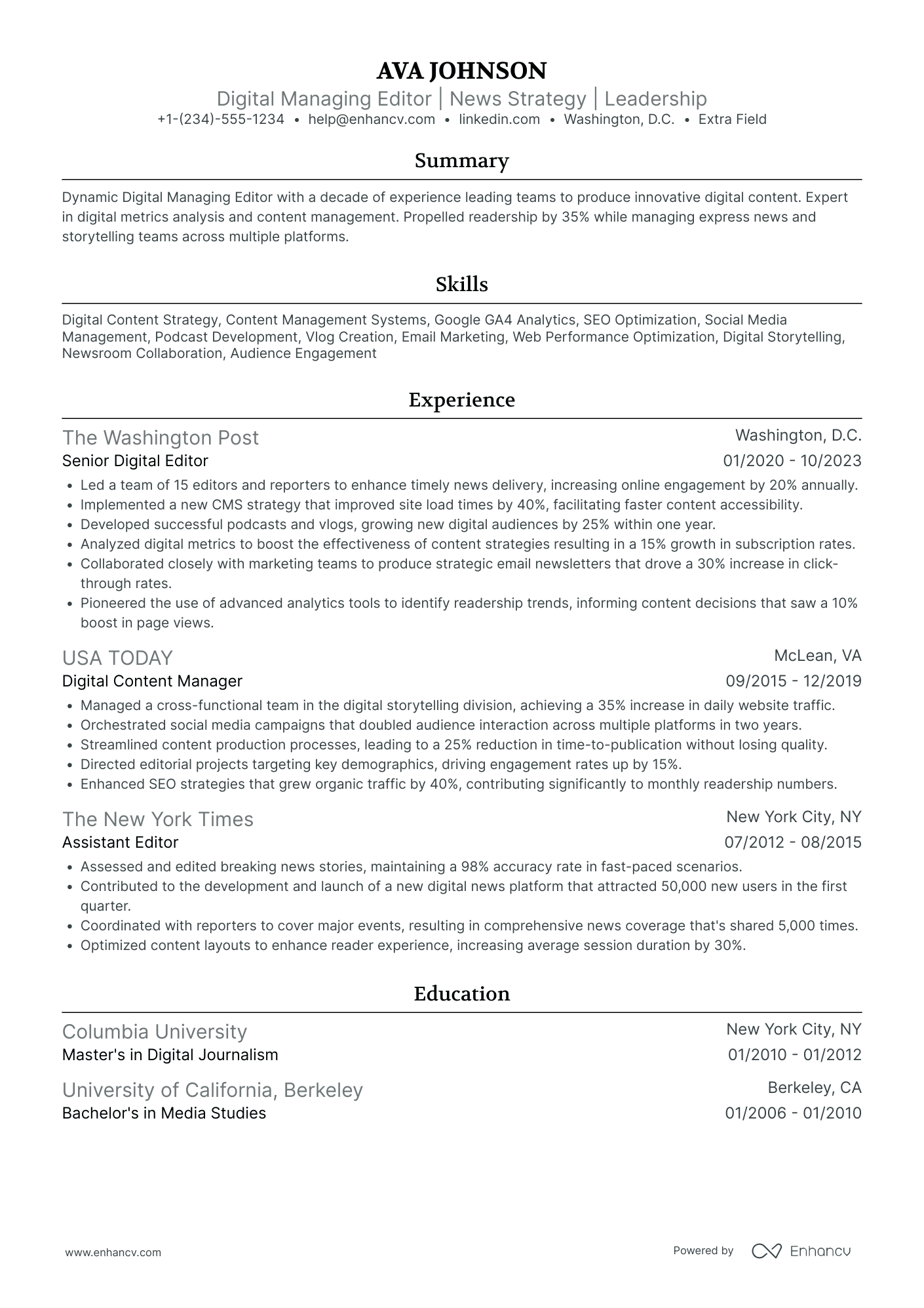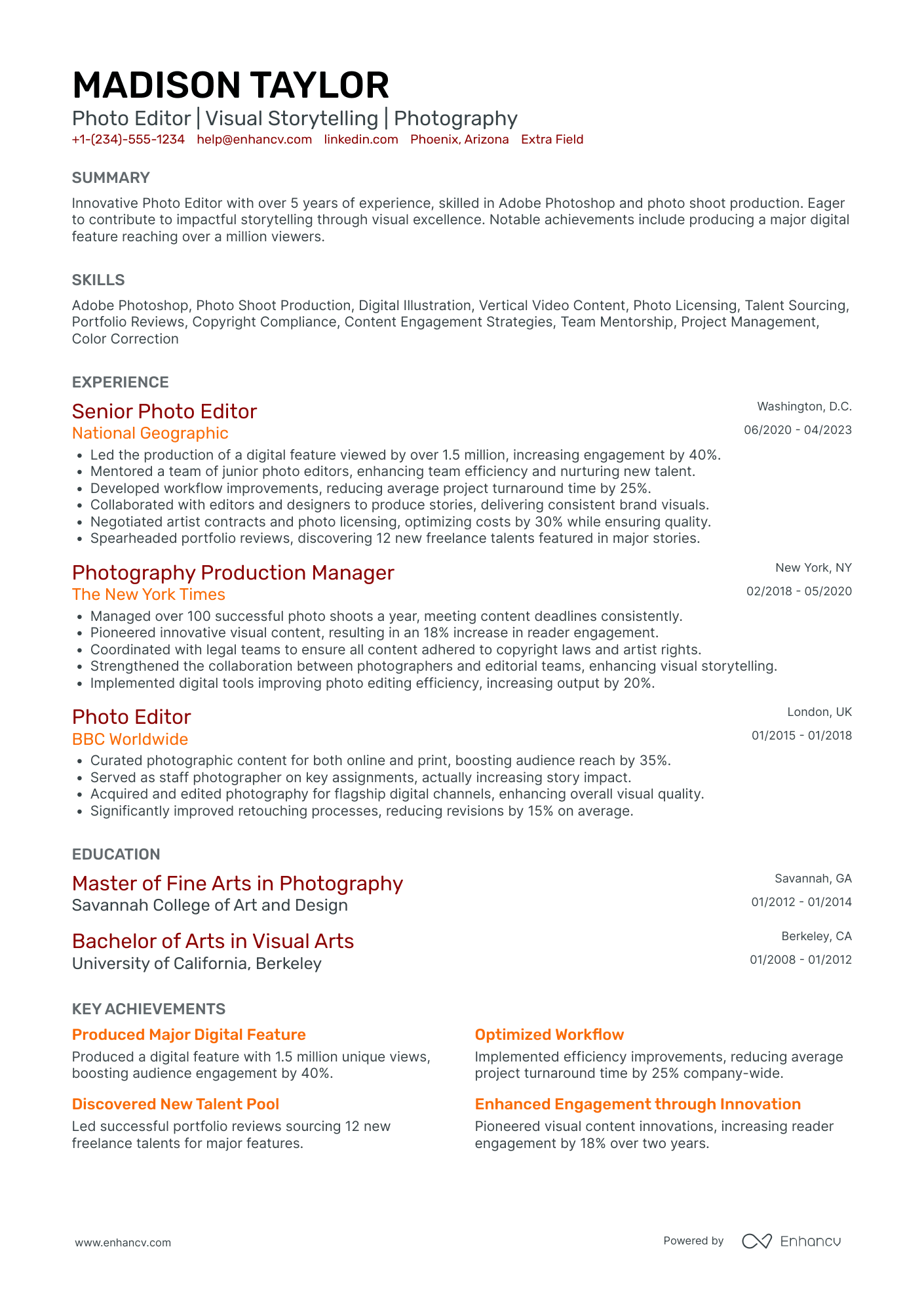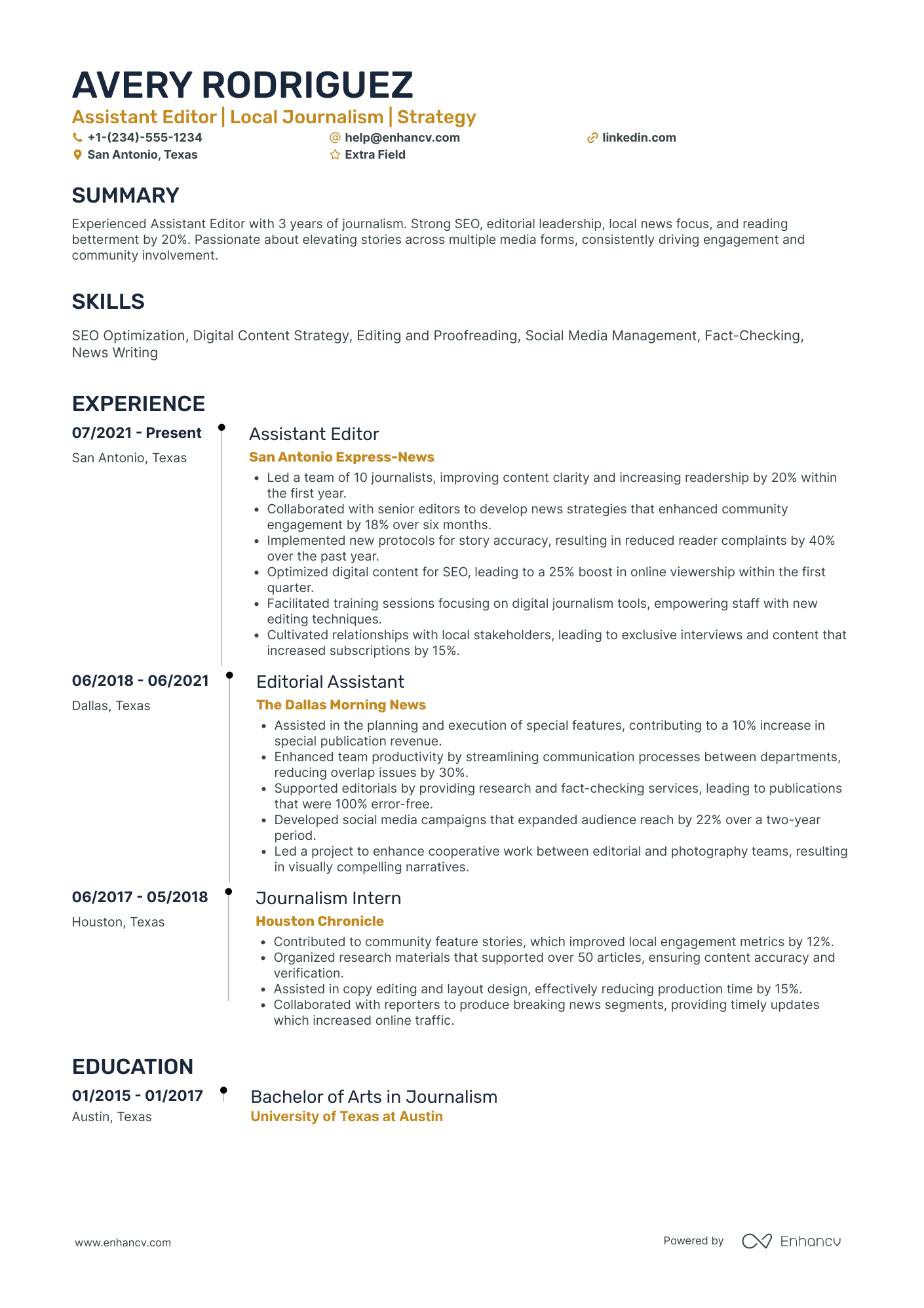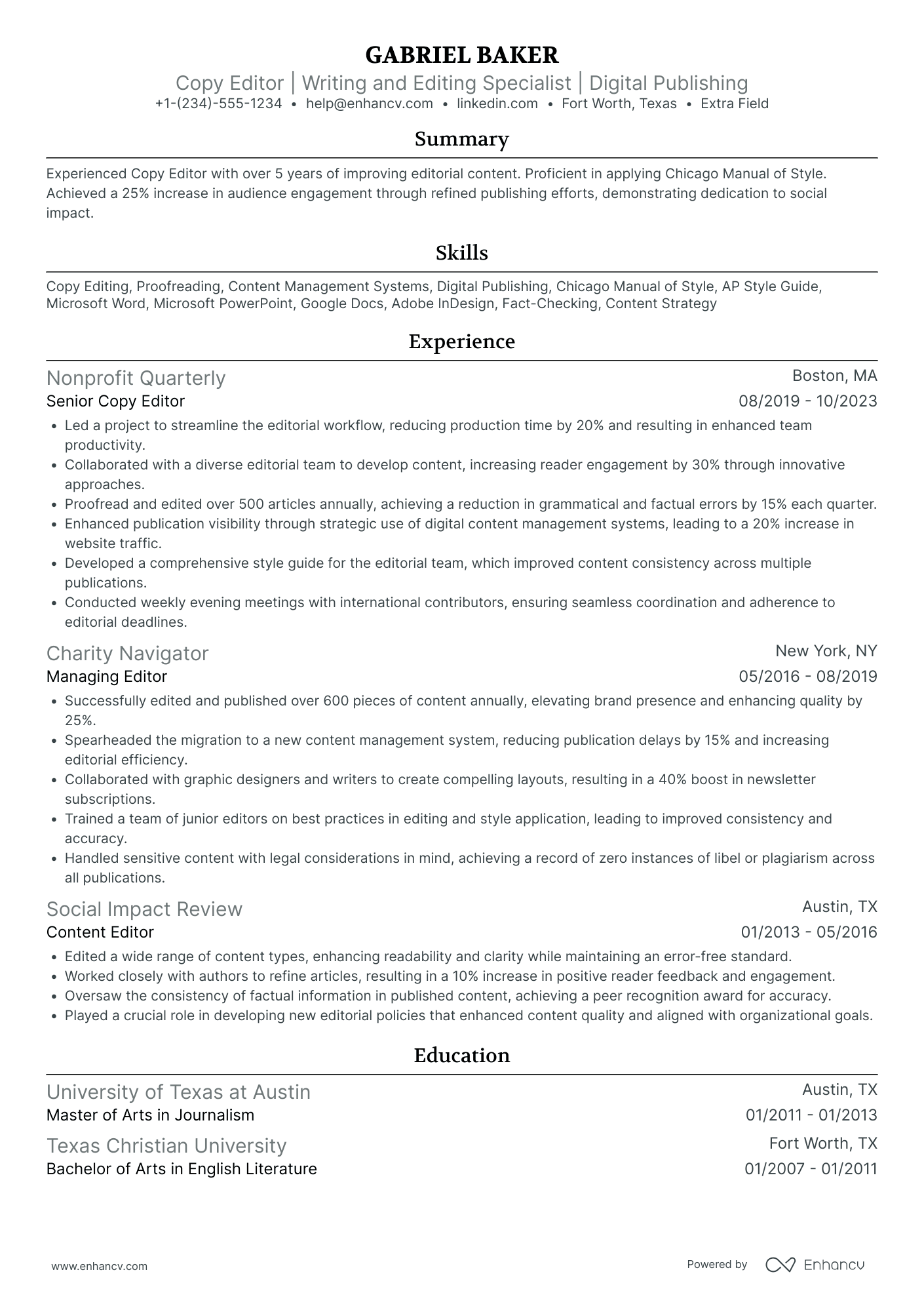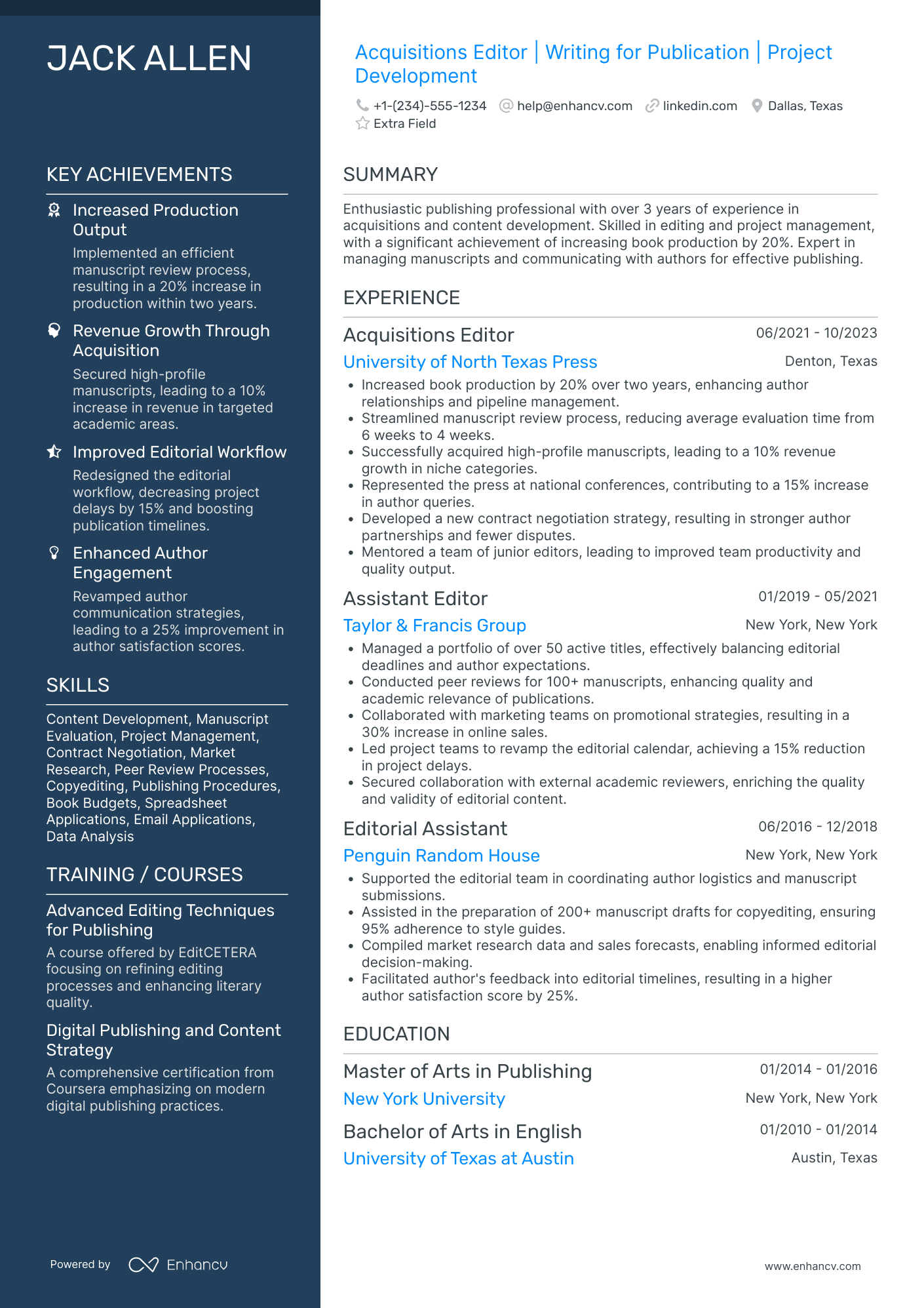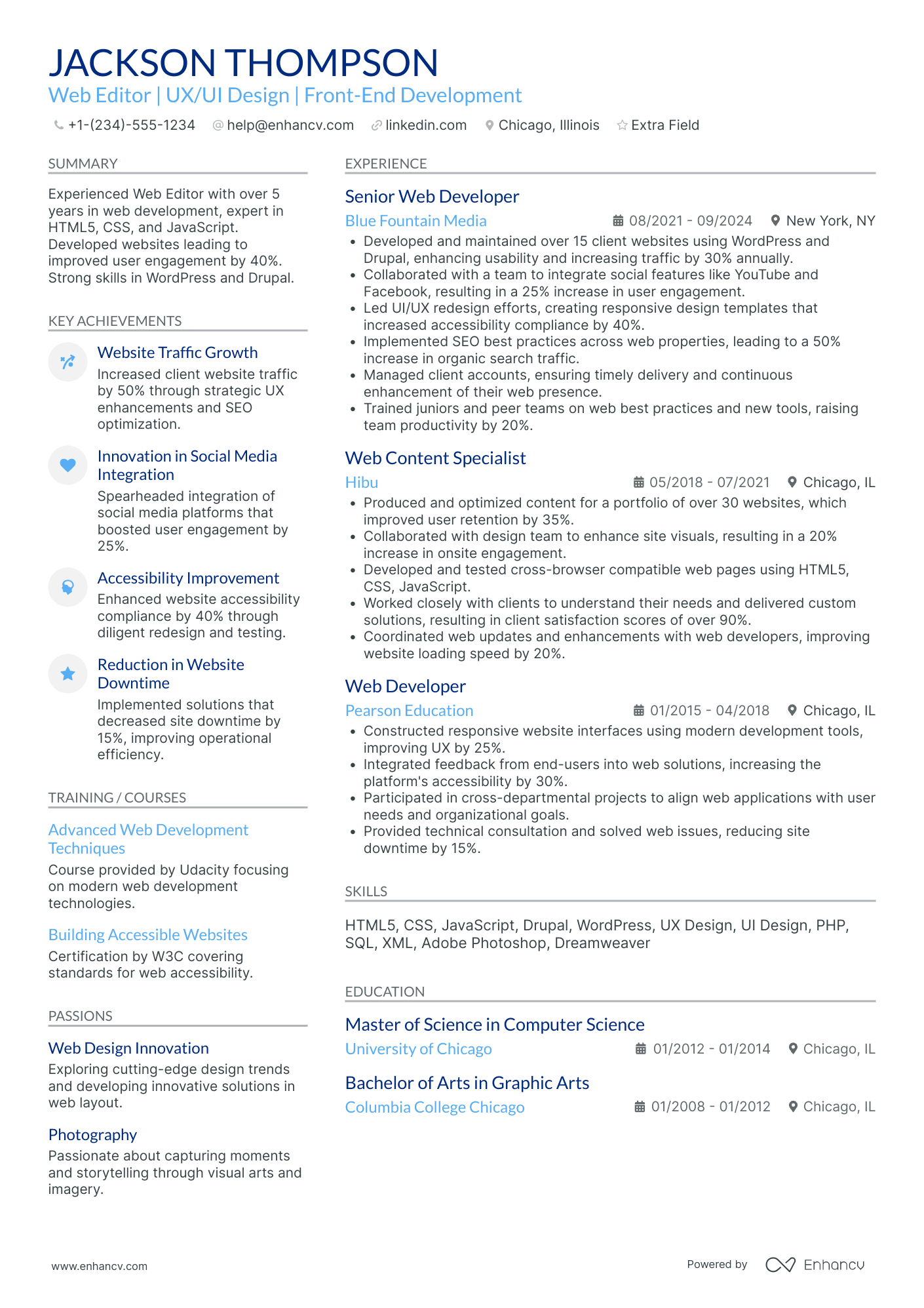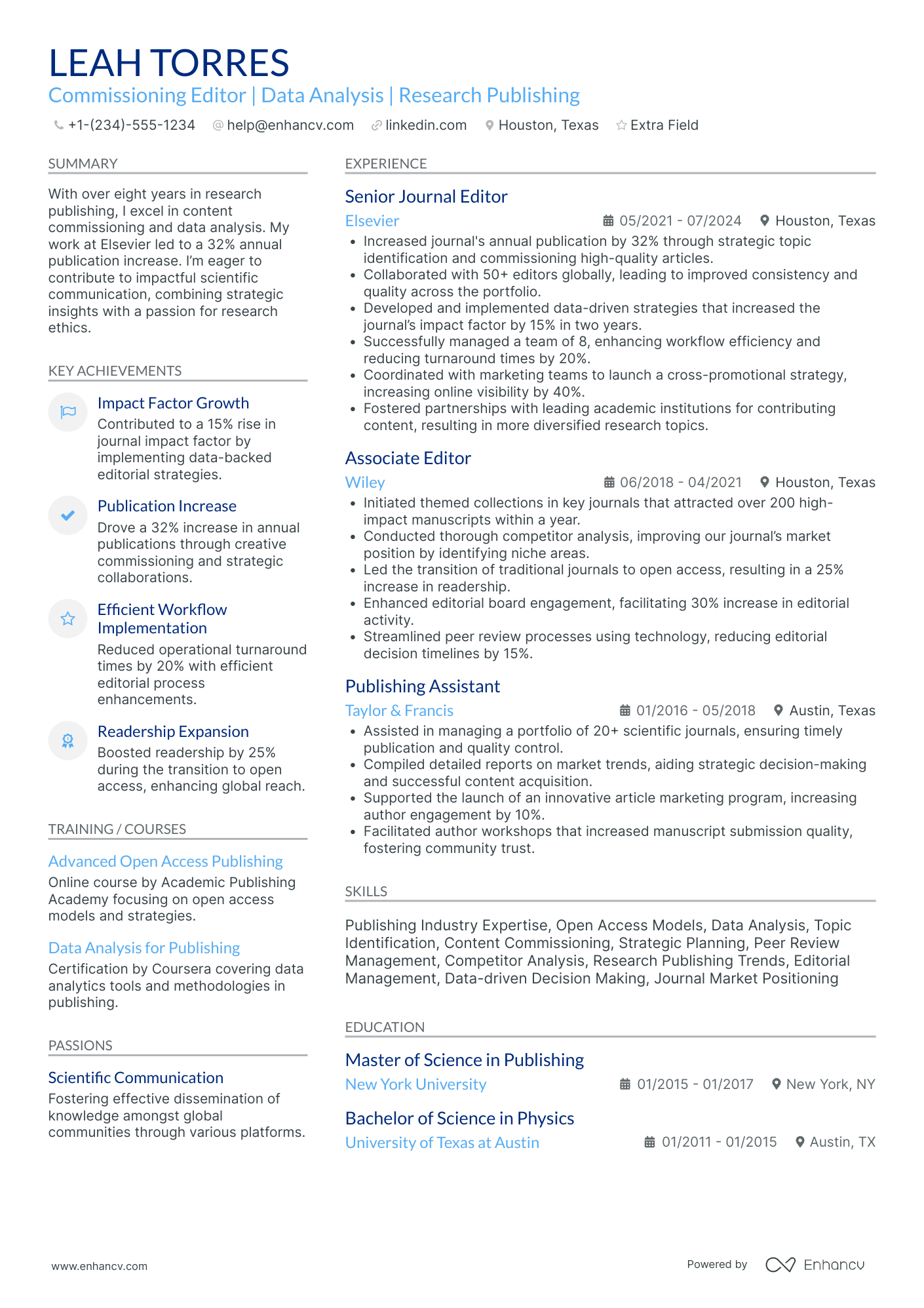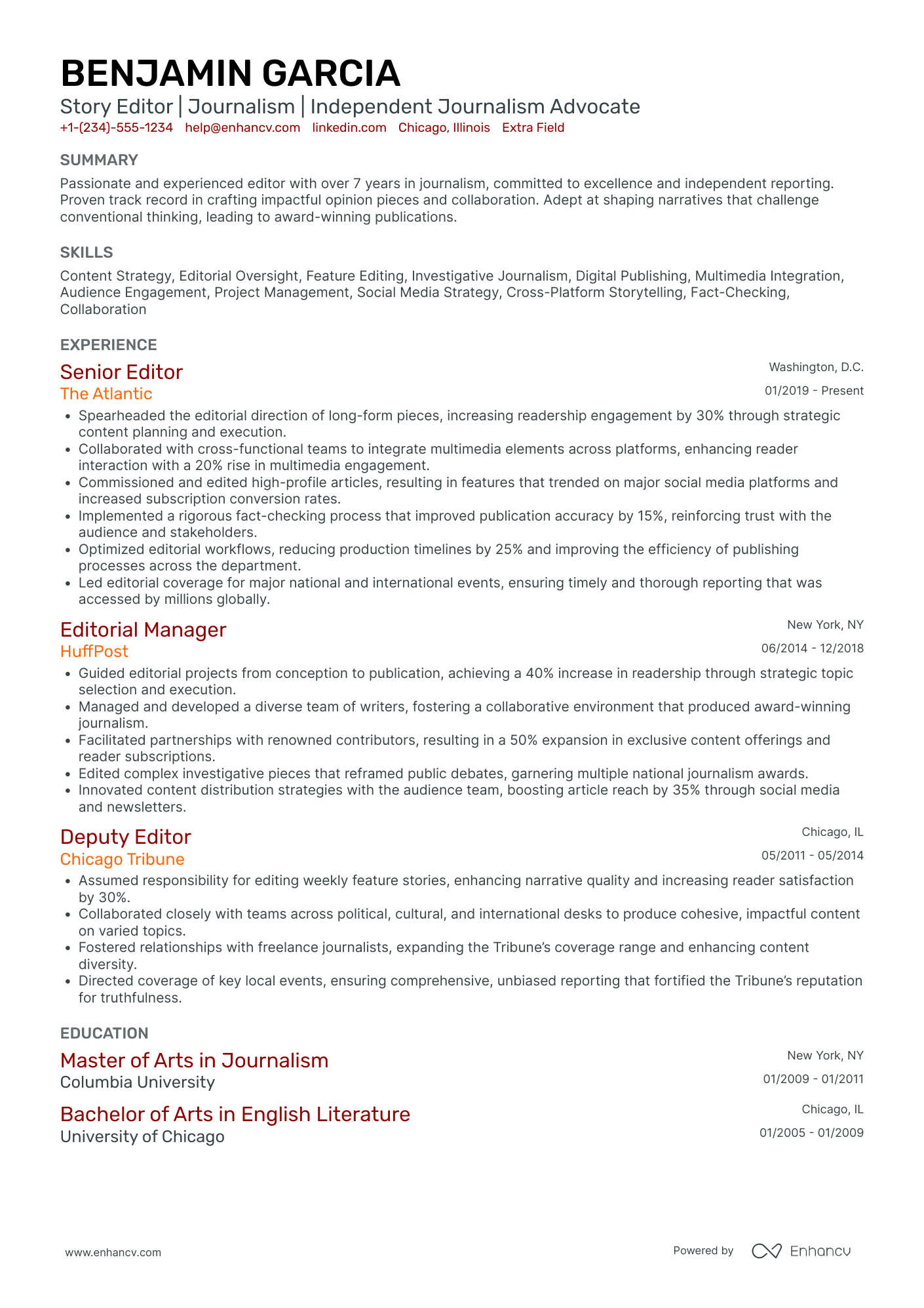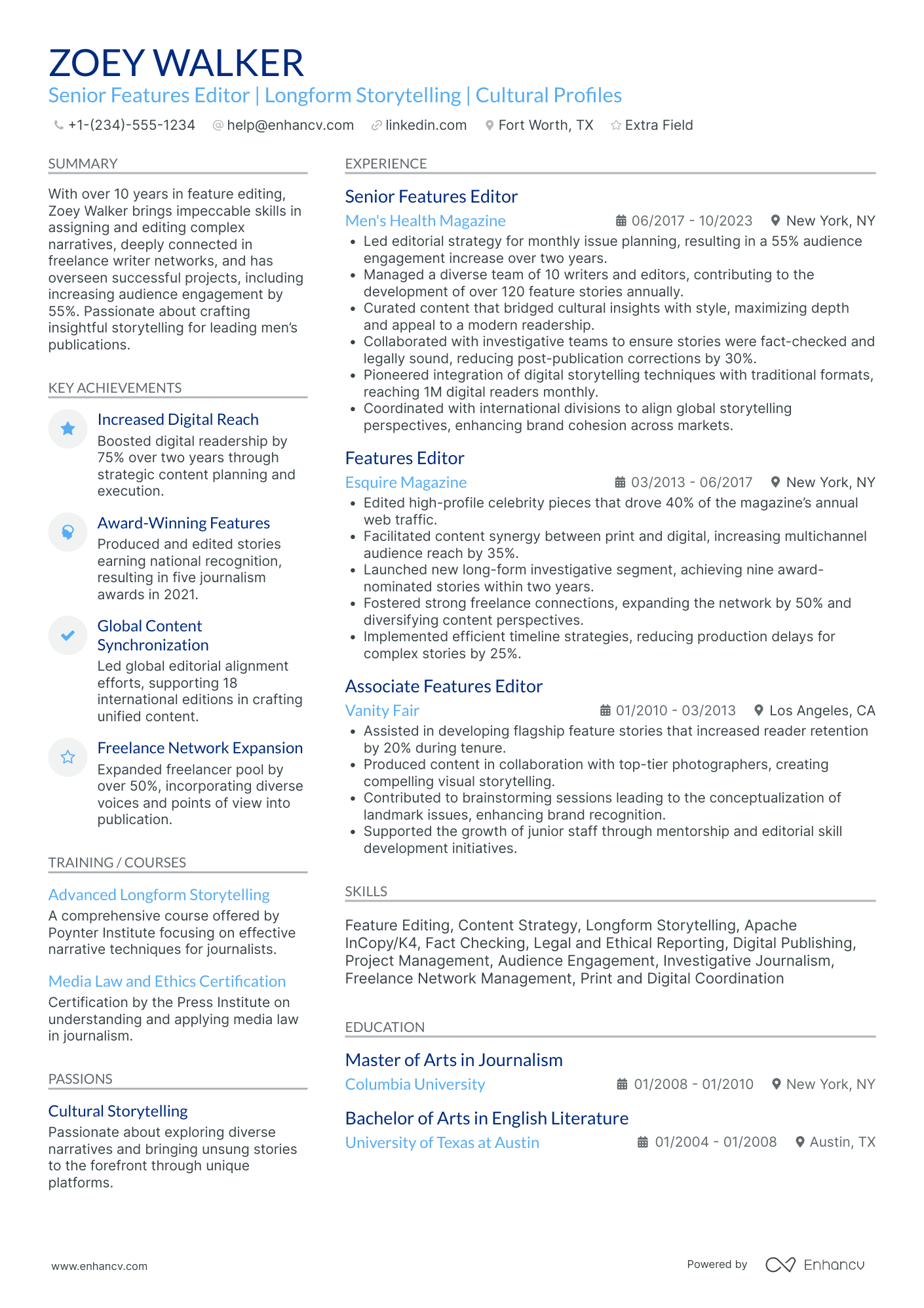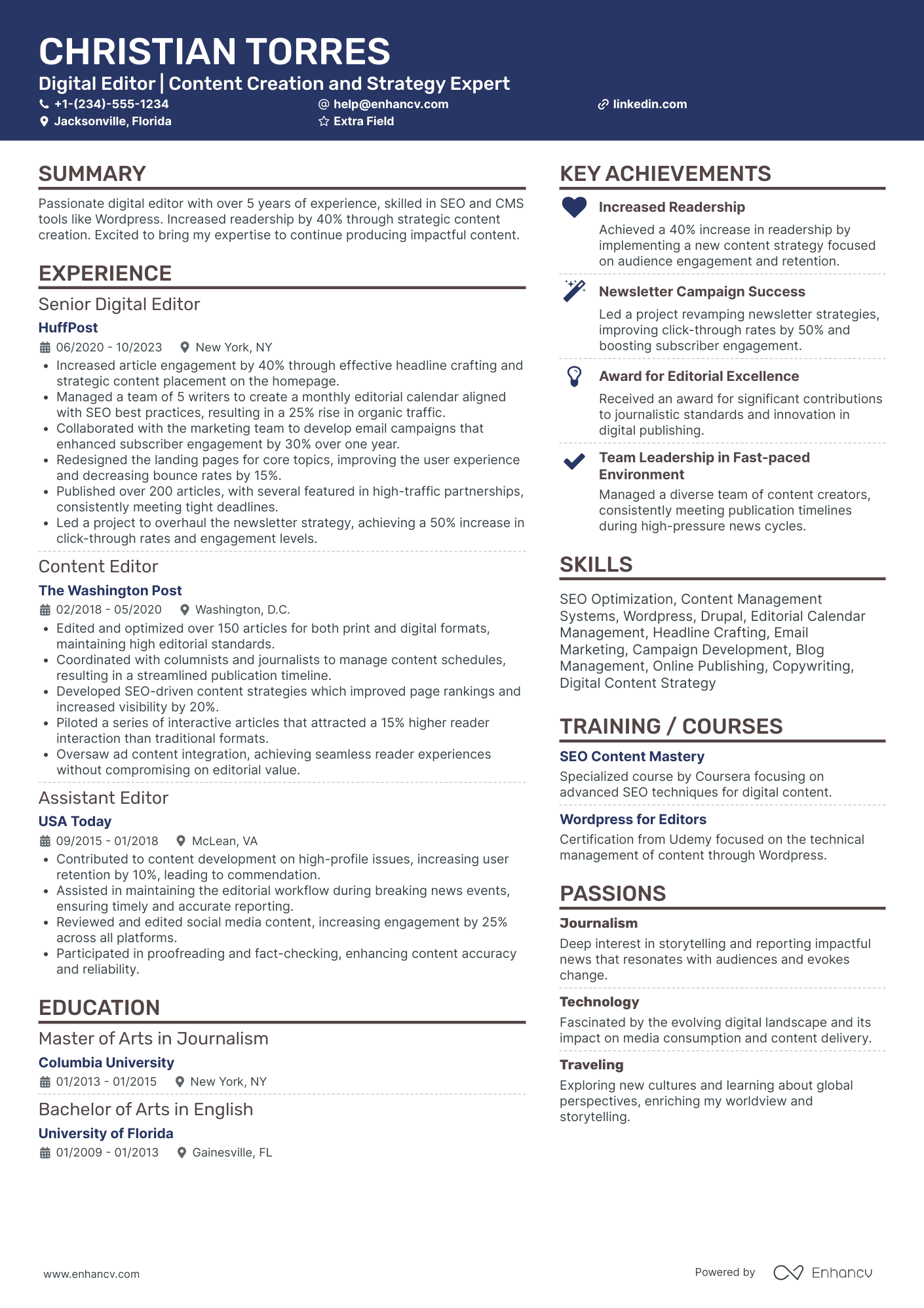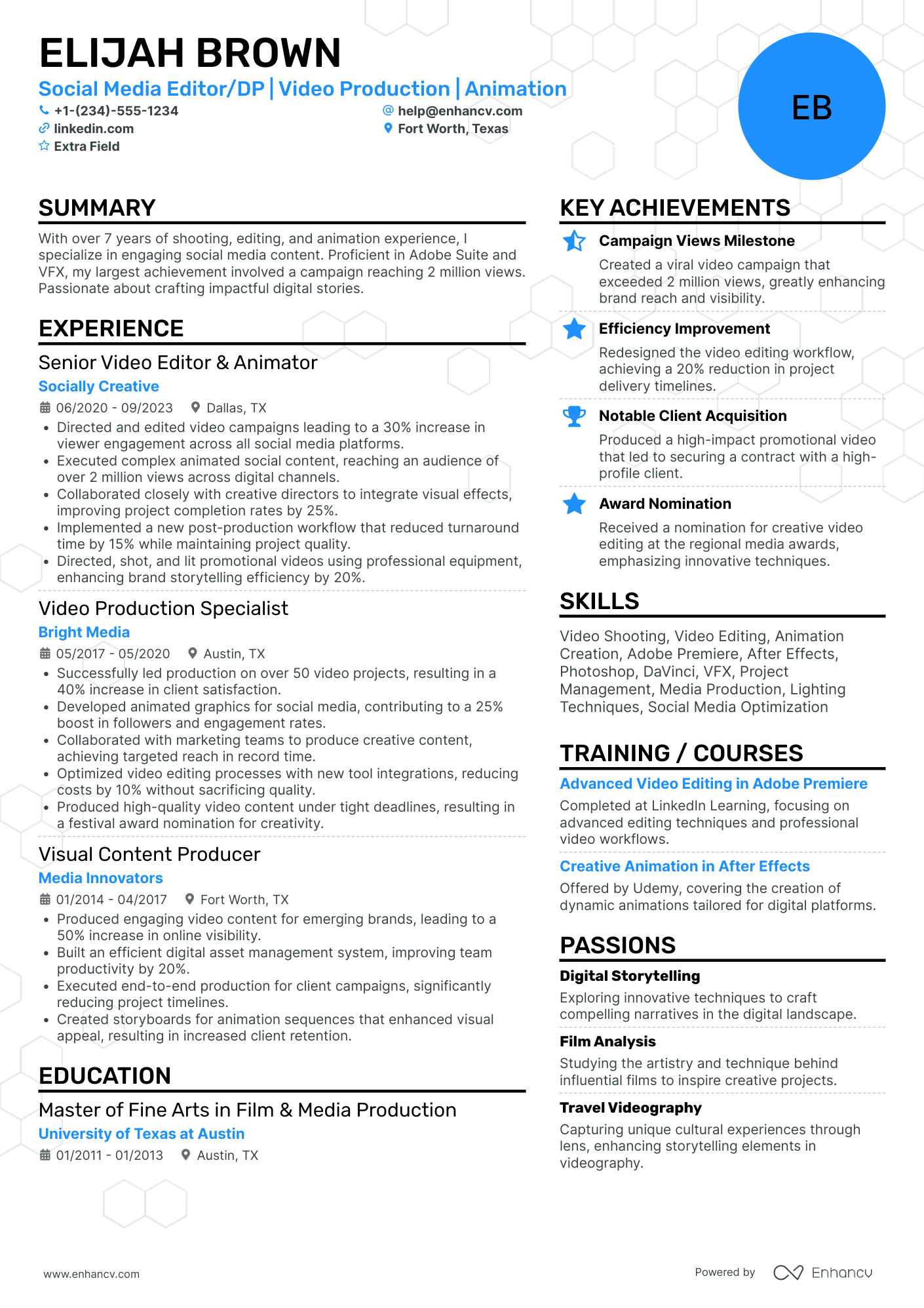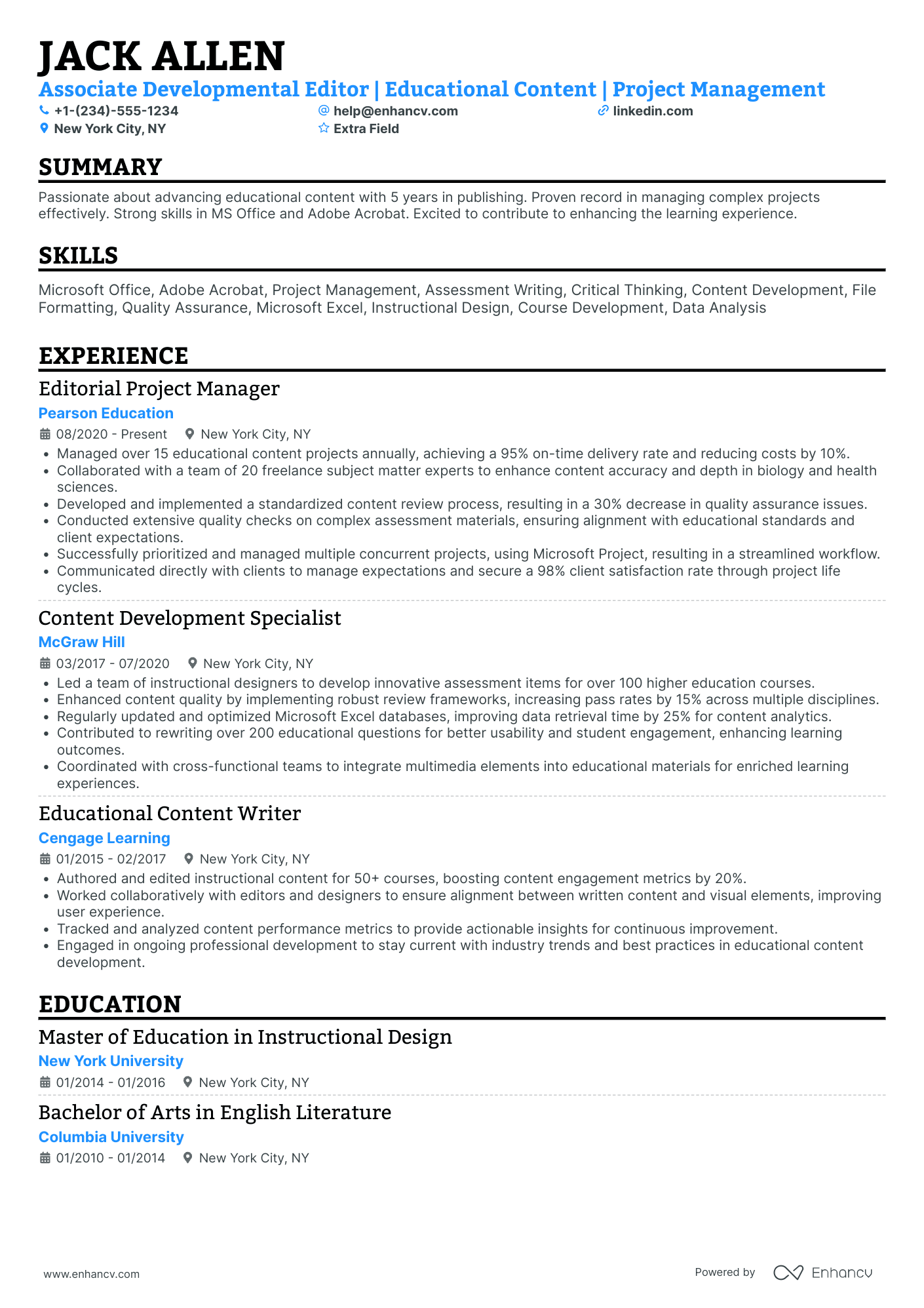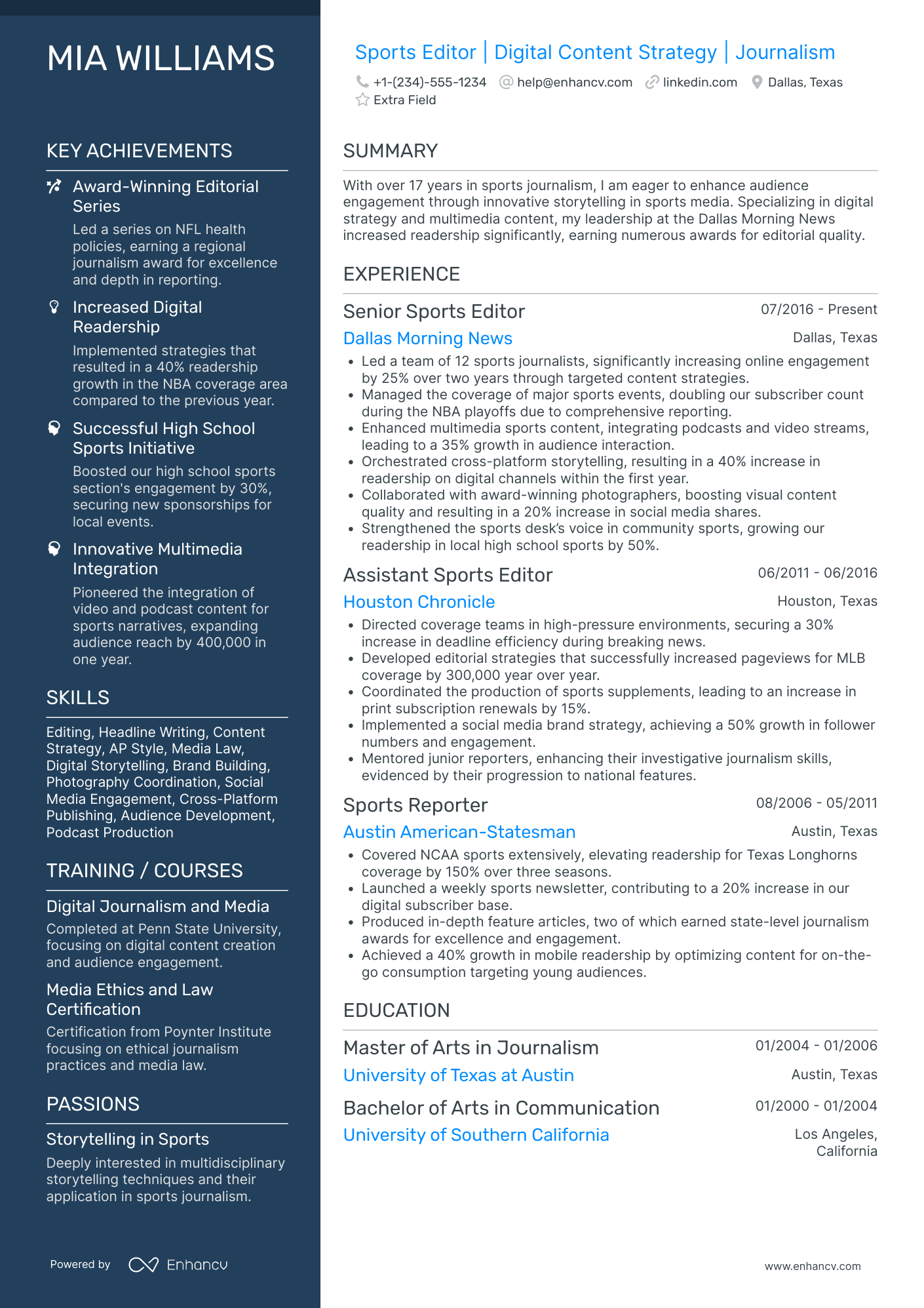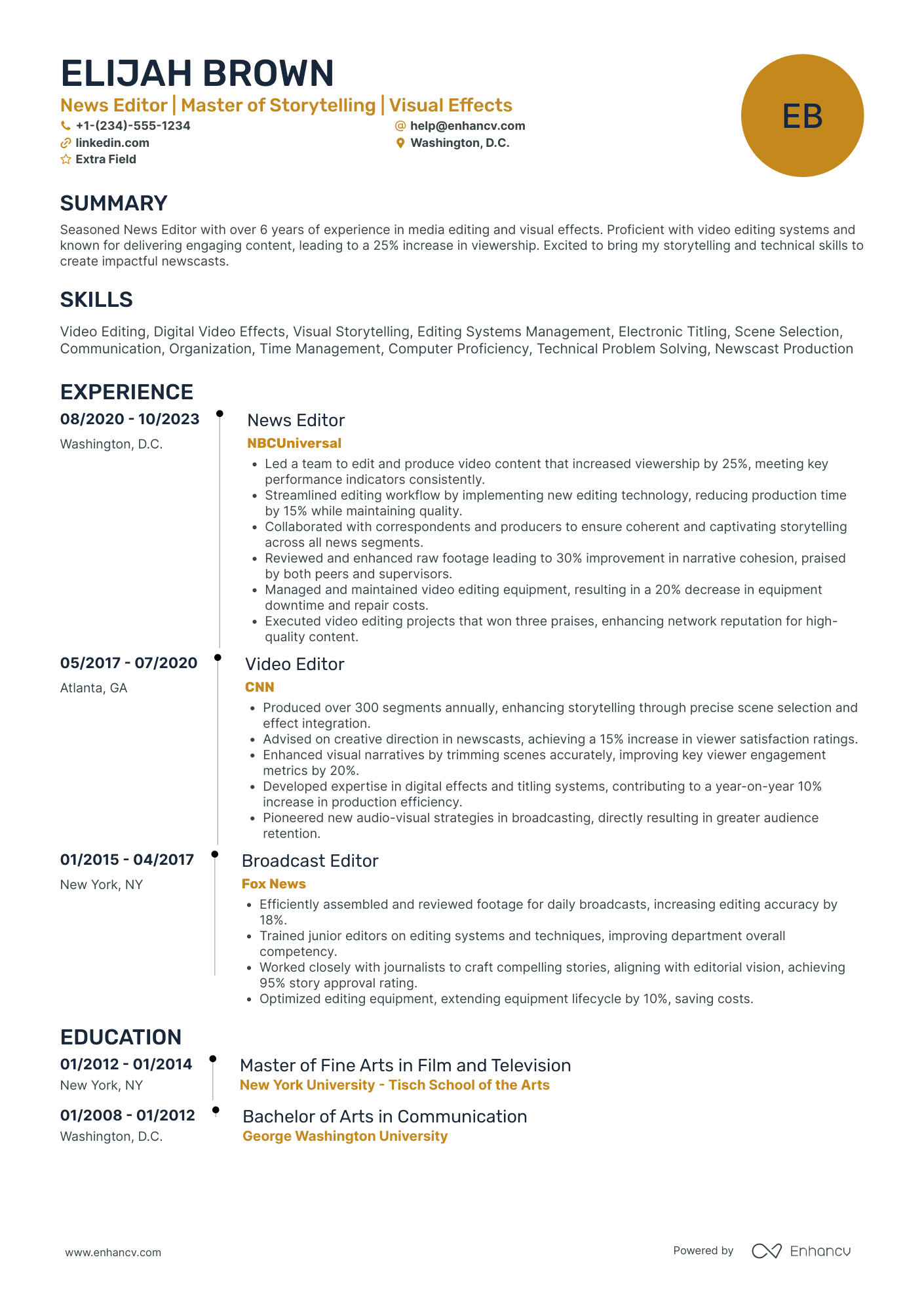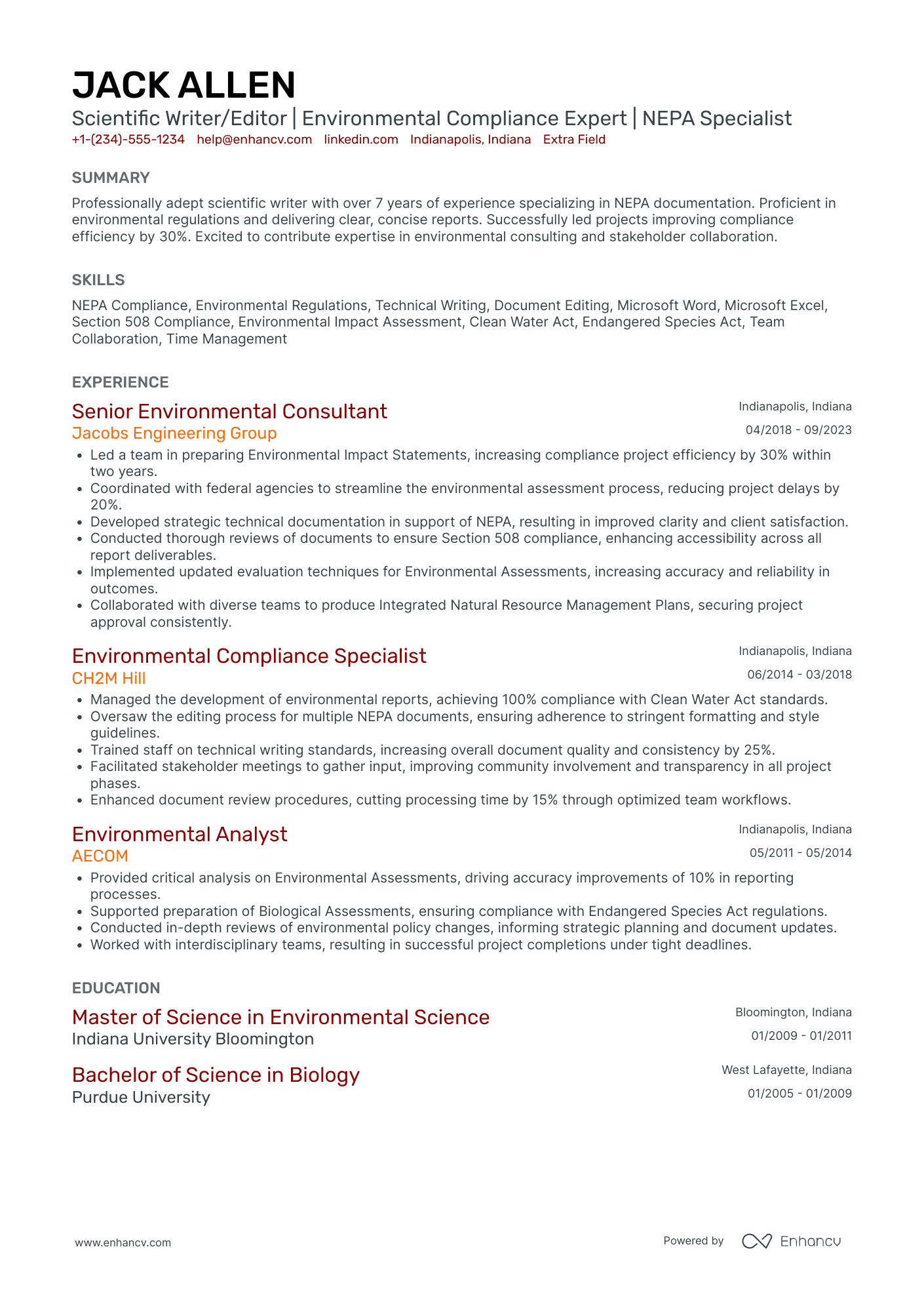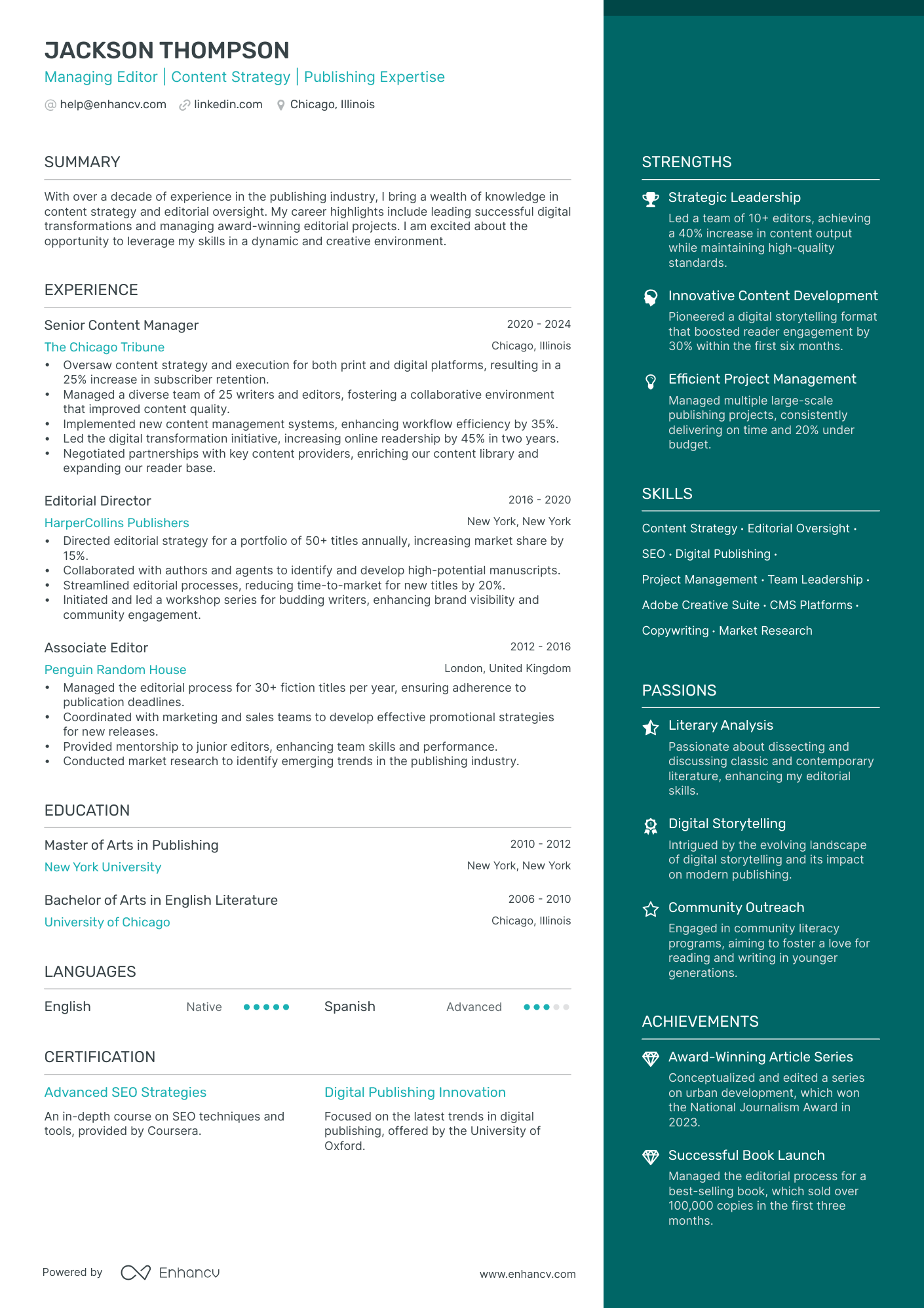An experienced editor has the unique talent of picking a slightly tarnished needle out of a haystack of pristine needles. Demonstrating this unique skill set comes with some challenges that editors need to be aware of when updating their editor resumes.
Quantifying their work while showcasing their creative, technical, and business skills in a properly formatted resume is the first step in landing that dream editing job you’ve always wanted.
In this guide, we will show you how to write a professional resume for an editor that avoids some of the common problems they face when building a resume. These unique problems include:
- Using an industry-standard format that demonstrates their technical and creative skills
- Including freelance work and personal projects that reflect specific job requirements
- Quantifying how their copyediting and writing skills benefited the company
- Highlighting a diverse skill set through hard and soft skills and personal interests
- Showing memberships to networking and professional associations
We will also cover some additional sections that you can add to your resume to reflect more of your diverse skill sets and passions.
If an editor's position is not quite right for your career path, check out these resume guides for similar jobs:
Before we sink our teeth into building an attention-getting resume, let’s take a look at a real-world example of a resume for an editor.
Editor Resume Example
Without having to get very far, we can already see that Jackson is an experienced Managing editor with 10+ years of experience in content strategy and publishing. Notice how the resume summary includes his years of experience, industry-related keywords, and phrases like “managing award-winning editorial projects.” These are the things that recruiters want to see from potential employees.
When we get into Jackson’s work experience, we see a steady progression from Associate editor to Senior Content Manager. You want to format this section so that each job shows your career progression.
Lastly, this resume uses a two-column format. This is the preferred format for anyone who has several years of experience, like Jackson does. It allows him to include additional details that paint a complete picture of a highly skilled managing editor.
Here’s what else Jackson does well in their resume:
- Highlighting quantifiable achievements: The applicant effectively uses specific percentages to quantify their accomplishments, like a "25% increase in subscriber retention" and a "45% increase in online readership". This approach concretely demonstrates the impact of their work.
- Showcasing relevant certifications: Mentioning certifications like "Advanced SEO Strategies" and "Digital Publishing Innovation" aligns well with their role in content strategy and publishing, indicating a commitment to staying current in their field.
- Detailing diverse experience: The resume illustrates a broad range of roles within the publishing industry, from Senior Content Manager to editorial Director, showcasing versatility and depth of experience in various positions.
Now, we’ll spend a little time talking about formatting and the sections you need to include.
How to Format an Editor Resume
editors have a mix of technical, business, and creative skills that can quickly fill up a resume past its two-page limit. Building a resume is all about cherry-picking the jobs and skill sets that best match the job description.
Sounds easy enough, but many times, editors focus too heavily on their technical or creative skills and fail to demonstrate additional skills employers want to see.
We’ll go over which sections you need to include in a moment. First, we need to make sure your resume has the right settings. These include:
- One-inch margins on all sides
- Using a modern serif or sans serif font
- Listing dated entries in a reverse chronological order
- Including all necessary resume sections
Why does knowing these settings matter?
Hiring agencies and publishers use applicant tracking systems to weed through the hundreds of resumes they receive for a single position. Basically, ATS helps them sort out candidates that match the ideal profile, and there are certain format requirements your resume need to follow.
When creating a new document, you don’t have to worry about setting margins. All new documents come preset with one-inch margins and a default font such as Arial, Calibri, or Times New Roman. While these fonts are ok to use, they are a bit outdated and overused.
When you send your resume to a recruiter, don’t send it in its original format. Do a Save As and save it as a PDF type (.pdf). This will preserve the format of your resume and is accessible on most operating systems.
Enhancv resume templates include all of the correct settings and necessary resume sections and come in a wide range of modern and traditional styles. They include more modern fonts, like Exo 2, Lato, Montserrat, Raleway, and Volkhov, which can give your resume a cleaner, more modern look.
We also have exclusive resume sections to demonstrate your vast abilities.
Be aware of location-based layout differences – Canadian resumes, for instance, might differ in format.
Find out how your current resume stacks up against real-world examples by using the Enhancv resume checker.
Let’s take a look at the main sections of a resume and the type of information recruiters want to see from potential candidates:
The top sections on an editor resume:
- Header: You will include your name, phone number, email, professional social media link, and portfolio link. A photo or headshot is optional.
- Resume summary/objective: This section is where you will give a brief description of your career goals or objectives.
- Resume experience: List past full-time and contract editing jobs and any freelance or paid projects demonstrating your editing skills.
- Education: List any bachelor’s or master’s degree along with any certifications and continuing education courses.
- Hard and soft skills: Detail relevant technical, creative, and interpersonal skills in multiple resume sections.
What recruiters want to see on your resume:
- Specific editing skills: Employers want to see you are familiar with specific style guides, like APA, MLA, and Chicago.
- Professional affiliations: Listing memberships to national and local affiliations and networking groups shows you are active within the editing community and staying current with new trends and writing styles.
- Portfolio: Include a link to a website portfolio where you can list all of your work in one place.
- Project management: Highlight managing multiple projects to show you can handle large volumes of work.
- Relevant experience: Demonstrate editing skills in a relevant industry, such as medical, technical, or health and nutrition publications and websites.
We will get into which resume sections editors need to include later. First, we will address adding relevant work experience that demonstrates technical skills, business savvy, and creative talents.
How to Write Your Editor Resume Experience
The resume experience section can become pretty lengthy if you are not careful. Experienced editors can have multiple jobs within their careers. Your job for this section is to sift through them and select the best ones to showcase your skills.
In this section, you will add professional work experience and freelance projects where you put your editing skills to work. This can include projects for a person or company where they asked you to edit their book, manuscript, or other written material.
When adding your work experience, keep in mind the industry you are applying for. Editors need to create a more targeted resume, as many different industries need a professional editor.
Applying for an editor job for a health and wellness magazine will have different requirements than a book editor for a financial institution.
To give you an idea of how to format your resume experience section, we will look at a couple of real-world examples of work experience for an editor.
See if you can spot what’s missing from this example:
- •Responsible for writing, editing, and designing monthly publication for local New York magazine covering a wide range of stories
- •Grew sales by 125%
- •Awarded ‘Best Written Media in New York City’ award
- •Increased readership by 18%
- •Reduced costs by 20%
There is a lot of boasting going on with this resume and not a lot of details to back up their statements.
You want to include numbers and percentages to quantify your results, but you must clarify how you accomplished such an amazing feat. Don’t just say, “increased sales by 125%,” without some indication of how you did it.
Notice the lack of job-specific keywords. This example will score poorly with applicant tracking systems and fail to impress the hiring manager.
Also, never take credit for a team effort. All this does is show you don’t know how to play well with others and can be disruptive in a team environment.
The result? No invitation to interview.
Let’s try this again:
- •Managed writing, fact-checking, design, and publication team for monthly print and online magazine with a circulation of over 1.5 million
- •Provided critical evaluations of proposals, research, and manuscripts for 100+ feature stories and columns
- •Created and maintained budgets maximizing allocated funds, which led to a 20% reduction in costs while increasing readership by 18%
- •Commissioned writers contributing to 45 published issues
- •Grew sales by 125% through improvements in writing quality and engagement with target audience
We now get a better picture of how this person managed to achieve that 125% sales growth. They do a great job of listing the size of their readership, which is a key point to include in this section.
Here’s what else this resume experience example does well:
- Correctly quantifies their achievements - “20% reduction in costs… 18% increase in readership”
- Details business and technical skills - “Provided critical evaluations of proposals… Created and maintained budgets”
- Lists leadership abilities - “Managed writing, fact-checking, design, and publication team”
- Includes special recognition - “Awarded ‘Best Written Media Award in New York City’”
Notice how they used the company information line to acknowledge an award they achieved. This is a good example of listing relatable information without adding an extra bullet point.
Later on, we’ll go over other sections where you can include this information.
How to quantify the impact on your resume
Using numbers and percentages is the best way to show potential employers how your work made a difference at your last job or project. This can be a little tricky for editors as some jobs don’t often have detailed reports that quantify their actions.
As an editor, you should be familiar with using Google Analytics to analyze reports and gain insights into how your work impacts reader engagement, reach, and performance of articles and posts.
Here are some examples of quantifying the impact on your editor's resume:
- Digital analytics - “Researched and implemented technical and on-page SEO recommendations that increased organic traffic by 80%+ and secured $2M+ in annual revenue growth.”
- Contribution to sales or funding - “Edited and rewrote existing grant proposals that secured over $500,000 in funding for nonprofit initiatives.”
- Customer satisfaction - “Delegated and tracked staff member assignments to ensure deadline adherence, leading to a 30% increase in customer satisfaction and a 10% increase in published material.”
- Error reduction - Developed and implemented a new editorial style guide, resulting in a 25% reduction in editing time and a 30% decrease in errors.”
- Achievements in publishing - “Edited 30+ manuscripts for multiple authors, of which 5 became New York Times Best Sellers.”
- Improvement in readership or engagement - “Edited manuscripts for grammar, punctuation, syntax, and clarity, resulting in a 20% increase in manuscript quality and a 5% increase in reader engagement.”
- Efficiency gains - “Provided concise and constructive editorial feedback to writers, leading to a 15% increase in publishing output.”
- Project volume - “Developed and managed 12 projects from concept to completion, including storyboards, post-production editing, and final delivery to the client.”
Next, we will focus on writing your resume section for those who are looking for their first editorial job.
How do I write an editor's resume with no experience
Just because you don’t have any real-world experience as an editor does not mean you aren’t qualified for an editor position. Even the most senior book editors once stood in your less experienced shoes.
Most employers want their editors to have a minimum of 5-10 years of relatable experience to qualify for the position. If you have experience working as a copywriter, proofreader, technical writer, or publishing assistant, you have the right skills and experience to become an editor.
You will detail your relatable work experience by focusing on those skills listed in the job description. Like so:
- •Authored and led advertising campaigns to raise brand awareness
- •Created and supervised work schedules to maintain efficiency
- •Collaborated with cross-functional teams to ensure 100% of ad campaigns met deadlines and project criteria
- •Managed a team of 5 freelance ad-writing experts to develop creative ads
In four detailed lines, we get a clear picture of this person’s leadership abilities and how they are comfortable supervising teams of diverse people. They do an excellent job of highlighting their creative abilities as well as their marketing and business sense.
Before moving on, let’s look at an example of a resume experience section for a freelance editor.
Freelance work has become more popular recently, especially for writing and editing jobs. Editors who work freelance will format their work experience a little differently.
Check out this freelance resume experience example:
- •Provided copy-editing services for 6 technical publications ensuring each article and post maintains the publication voice and brand
- •Edited articles for grammar, spelling, and punctuation errors, resulting in improved readability and a 20% increase in audience engagement
- •Collaborated with staff writers to improve article structure and flow, enhancing the overall quality of the publication
- •Met tight deadlines while maintaining attention to detail, contributing to the timely publication of high-quality articles and blog posts
Notice how there is no company name. You don’t have to write a separate job for every freelance project if they are within the same industry. If you did that, you would end up with a resume well over the two-page limit.
If you do include freelance editing gigs, you will need to include a portfolio link so they can read your work. You can use the resume header to include that link, like so:
If you edit or manage multiple social media pages, add that to your portfolio as well.
Now, we will talk about the best way to include additional skills and other information that can help you land an editing job.
How to List Your Hard Skills and Soft Skills on Your Resume
Experienced editors will have a long list of abilities, from analyzing sales trends and using editing software to having excellent oral and written communication skills and effective time management skills.
These are those all-important hard and soft skills that you keep hearing about. What are hard and soft skills?
- Hard skills incorporate those technical skills that you learn in school and through real-world work experiences. They teach you how to use specific software and apps, writing styles, and analyze reports and metrics.
- Soft skills are more intuitive and learned through various life experiences. They include valuable skills like critical thinking, expressing empathy, and being an active listener. These are the skills you learn while interacting with family, friends, and peers.
When you add your hard and soft skills to your resume, you want to put those skills that are listed in the job description first.
Employers enter these skills into applicant tracking systems to help them find qualified candidates. When you add your skills, you want to match exactly the skills listed in the job description.
If the job lists “Proficiency in using editing tools, content management systems, and AI,” those keywords need to be in your resume. Either listed in the details of your resume experience, resume summary, or under a skills section.
This will increase your chances of scoring higher with applicant tracking systems and getting the attention of whoever is reading your resume.
Here are the most requested skills that recruiters and publishing houses are looking for in their editors:
Best hard skills for your editor resume
- Proficiency in language and grammar
- Editing and proofreading
- Familiarity with all writing style guides
- Technical writing
- Publishing software
- Search Engine Optimization (SEO)
- Fact-checking
- Researching
- Typing and data entry
- Project management
- Digital media software
- Social media
- Copywriting laws
- Basic design skills
- Basic computer skills
- Language transition
Best soft skills for your editor resume
- Communication
- Attention to detail
- Critical thinking
- Analytical skills
- Creativity
- Problem-solving
- Time management
- Organizational skills
- Adaptability
- Collaboration
- Patience and perseverance
- Attention to detail
- Leadership
- Conflict resolution
- Cultural awareness
- Stress management
- Ethics
- Curiosity for learning
We’ll talk about additional sections you can add to your resume to show off more of your relatable technical and business skills later on. First, we need to work on adding your education to your resume.
How to List Your Certifications and Education on Your Resume
Listing your post-secondary and continuing education on your resume is required for all resumes. Without these sections, recruiters won’t be able to assess your experience properly.
Even if you graduated in the 1900s, you still need to post your education. Employers want to see you have the fundamentals of editing along with showing advanced learning through certifications or continuing education programs.
When posting your learning credentials, you want to include:
- Degree
- School name and location
- GPA
- Dates of enrollment/graduation date
Here is an example:
If you are fresh out of college with less than one year of work experience, you can add bullet points to your education to detail relatable skills, like so:
- •Achieved Dean’s List all 4 years
- •Editor for University Newsletter during junior and senior years
- •Organized and led small writing groups consisting of five members each
- •Won ACES scholarship during junior and senior years
Earning an advanced certification in editing demonstrates you have the necessary skills for the job and are willing to do everything possible to improve your skills.
All you will need to include for this section is the name of the certificate and the company that provided the training:
Best certifications for your editor resume
Editors can also hone their editing skills through several universities and continuing education programs.
If you want to gain more skills, consider enrolling in one of these programs to further advance your editing skills:
- UC San Deigo Copyediting Program
- Emerson College Copyediting Course
- Writer’s Digest Copyediting Certification Course
- The University of Chicago Editing Certification
- Proofreading and Copyediting with The Chicago Manual of Style
How to Write Your Editor Resume Summary Or Objective
The way you write this next section will depend on your experience level and career objective.
Your goal will be to describe your experience and how that experience can benefit the company.
In choosing between writing a summary and an objective, answer the following questions:
- How many years of experience do you have as an editor?
- Are you looking for an editor job within the same industry?
- Is this the first editor job you are applying for?
A resume summary is a career summary for someone with 5-10+ years as an editor in a specific industry, such as media, financial, or medical copywriting. It is for those who are looking for a new job within the same industry.
A resume objective is for the newly graduated with only a few years of experience and experienced editors who want to edit a different genre or media type. It describes their objectives in their career search and their eagerness to expand their skills.
Let’s dissect a real-world example of a resume summary for an editor with 8 years of experience in publishing.
span>This is a good example of what not to do. This section is your first chance to make an impression, and you want to tailor it to include relevant keywords in the job description.
When listing your job title, capitalize it. If you hold a certification in editing, now is the perfect time to bring that to the reader’s attention:
“AMWA Certified editor experienced in...”
This example reads more like a list of skills than a summary and gives little indication of their skillset or effectiveness as an editor. Use your writing skills and create a compelling summary that grabs the reader's attention and encourages them to continue reading.
Let’s revamp this a little to see if we can improve it:
If you were recruiting for an editing role, you’d want to hire this person in a heartbeat. Without reading the resume section, we already get a good indication of this person's experience and how they use their skills to improve the magazine circulation rates.
This resume summary does a great job in:
- Using multiple industry-related keywords that applicant tracking systems search for
- Quantifying their work experience to show positive engagement and increased readership
- Detailing creative, technical, and business skills
Now that we’ve covered the five main sections of your editor resume, let’s focus on how to list additional skills that contribute to your knowledge and expertise.
Optimize your resume summary and objective for ATS
Drop your resume here or choose a file.
PDF & DOCX only. Max 2MB file size.
Additional Sections for an Editor's Resume
Experienced editors will have a plethora of skills that contribute to making them proficient in their jobs. How do you know which skills to include? Study the job description.
Because you don’t want the resume experience section to balloon into a small novel, you will use other sections to detail relatable skills that the job description does not include.
Here are some additional sections that editors should have on their resumes:
Awards
You can include any awards or recognition received from college courses, freelance work, personal projects, and full-time jobs.
Spoken languages
Many large publishing houses sell books to countries all over the world. It can benefit you to list any foreign languages you speak and write along with your proficiency.
Enhancv special Spoken Language section with proficiency level:
Computer and software skills
Include additional computer hardware or software you have experience in that is relevant to your job but not in the job description. This will show recruiters you have a well-rounded background.
Workshops
Listing any writing or editing workshops you attended will demonstrate additional skills learned from industry experts.
Professional associations and networking
A good way to show you stay connected with others in the industry is by listing any memberships to local networking groups or national associations.
There are several professional associations editors can join to connect with others, stay current with new writing and editing trends, and find new job opportunities before they go public.
Here are some of the associations that are available for editors:
- American Copy editors Society (ACES)
- Editorial Freelancers Association (EFA)
- Council of Science editors (CSE)
- European Association of Science editors (EASE)
- Women in Publishing (WiP)
- Association of Art editors (AAE)
There is one more section we should talk about that editors can add to their resumes.
Listing your publications on an editor resume
Book editors are crucial in the publication process and play a pivotal role in its success or failure. A poorly edited book will be hard to read and give the writer a bad reputation.
If you have edited a published book or written a book on editing, you can list them in the publication section of your resume, like so:
Key Takeaways
We’ve covered a lot of important steps in creating a professional resume for an editor. Now it’s time to use this information and get yourself that dream editing job.
When finalizing your resume, keep in mind these crucial steps:
- Demonstrate a mix of technical, business, and creative skills in multiple sections
- Use numbers to quantify your abilities in the summary and resume experience sections
- Include hard and soft skills that are listed in the job requirements
- Detail additional skills that showcase a diverse background
- List any relevant publications
Editor resume examples
By Experience
Senior Editor
Junior Editor
By Role
